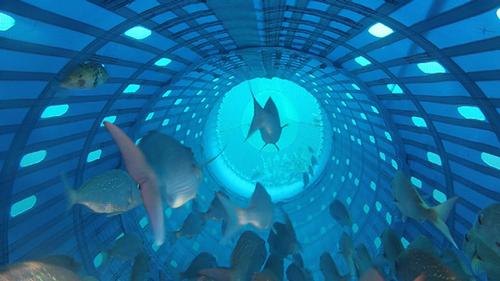Future fishing revealed in NZ
by Media Services on 22 Oct 2013

MTS snapper in trawl 03 SW
New trawling technology - billed as 'the future of sustainable fishing' - was unveiled to the New Zealand seafood industry at its annual conference in Auckland last week.
The system, which has been in development in NZ for almost 10 years, uses a large, flexible PVC tube instead of a traditional mesh trawling net.
New Zealand fishing companies Aotearoa Fisheries, Sanford and Sealord are investing NZ$26 million into the commercialisation phase of the technology, called Precision Seafood Harvesting.
The Government is matching industry investment and scientists from Plant & Food Research, a Crown Research Institute, are working with the three fishing firms to trial the system on commercial vessels.
Sanford managing director Eric Barratt said precision harvesting was the 'biggest step forward' the fishing industry had taken in 150 years and could be put to use in New Zealand's commercial snapper fishery within two years.
The PVC tube is towed behind a fishing vessel like a regular trawling net and contains small portals through which juvenile fish can escape.
It is hauled on to a vessel full of water with the aim of keeping the fish inside alive.
The new fishing system is designed to reduce injury and death caused to unwanted bycatch in traditional nets.
Once on deck, the water is released and the crew can sort through the catch as it spills out one end of the tube.
Any by-catch, such as sharks or stingrays - as well as juvenile fish that didn't manage to escape through the portals - can then be released back into the ocean alive, the developers of the technology claim.
As well as enhancing the quality of the catch, the system may also allow fishing firms to supply customers with live fish.
Traditional trawling nets kill most of the catch by the time it's hauled on to a vessel.
And trawlers that net more than their entitlement of legal-size fish must also pay penalty rates to the Government, which results in the illegal practice of dumping dead fish overboard.
'What we've developed in New Zealand has huge benefits for fish stocks, the environment, consumers and New Zealand's seafood industry,' said Barratt, who is also the chairman of industry group Seafood NZ. 'In the process we're set to change the global fishing industry for the better.'
Barratt said trials had already indicated that the system could help address issues in the northern North Island snapper fishery, known as 'Snapper 1'.
The new fishing system is designed to reduce injury and death caused to unwanted bycatch in traditional nets such as this one. In an effort to address dwindling snapper numbers, the Ministry for Primary Industries increased the size limit from 27cm to 30cm and decreased the daily bag limit from nine to seven for recreational fishers last month. A 25cm limit remains in place for commercial operators.
The changes angered many recreational anglers, who say the problems in the Snapper 1 fishery are the result of commercial trawlers killing juvenile fish.
Barratt said the new system allowed commercial operators to fish for snapper selectively.
There are also commercial benefits for fishing companies.
A presentation delivered to an OECD conference last year estimated that quality improvements gained through precision harvesting would provide fishing companies with $100 million in additional revenue annually. Barratt said it was difficult to say how long it would take for all New Zealand trawling vessels to begin using the technology.
'At this stage there's a lot of work to go on with the New Zealand Government,' Barratt said. 'The Ministry for Primary Industries has to give a special permit to use this gear - it's not legal fishing gear right now in New Zealand. It will become legal.'
He said precision harvesting was not necessarily a more expensive fishing method than traditional trawling, although smaller volumes of fish were likely to be caught in each haul and there was the added 'weight challenge' of hauling fish and water on to a vessel.
The technology was already protected by patents and Aotearoa, Sanford and Sealord planned to licence the system to other commercial fishing operators, Barratt said.
Speaking before this afternoon's conference, he said his 'gut feeling' was that other fishing industry players would initially be cynical about the system's potential.
'Some of our people were cynical when they first saw it, but once they saw it actually working they became converted.'
Aotearoa Fisheries chief executive Carl Carrington said precision harvesting would improve this country's environmental credentials. 'It enhances our access to sustainability-conscious consumers, improves product taste and quality and is good for value growth.'
Barratt said precision harvesting could be used for bottom-trawling as well as midwater trawling. Bottom-trawling is a controversial fishing method due to the damage it causes to seabeds.
More at http://precisionseafoodharvesting.co.nz/
If you want to link to this article then please use this URL: www.sail-world.com/115964